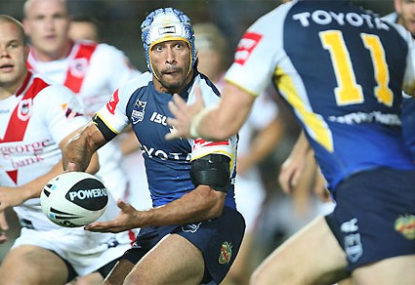NRL Round 8 Talking Points: The kick-off is on borrowed time, so what replaces it?
Round 8’s NRL was a weekend of domination, with an average win margin of 21 points and some teams seeing their finals hopes really…

The NRL’s opening round saw great matches played, some impressive crowd numbers and games on five days, but what stood out to me were the many areas where the NRL is performing poorly and falling further behind in the saturated Australian sporting market.
Yes, they were able to announce a $49.8 million profit last year, but taking into account a huge TV rights deal and a huge State of Origin series, are these numbers that impressive?
David Smith has done little to ease my doubts about rugby league having a bright future in Australia through very little innovation and next to no forward thinking.
So instead of being a couch critic I decided to make a list of all the improvements I would make if I were in his position and maybe someone will pay attention and ease my apprehension.
Improvement 1: Player trades
One only has to look at the Daly Cherry-Evans and Kieran Foran saga to understand why this issue needs solving this season.
European football leagues and American sports utilise a simple trade period. The NRL could employ something similar and put an end to season-disrupting player contract negotiations.
This period could start in November and last until mid-January, which would give all players a long enough preseason to be able to perform well and by the time the new season starts no team’s season is going to ruined by news that their star player is leaving next year.
A second trade period for players that are not getting game time or clubs that need replacements in certain positions due to injury issues can be designated for a week in June, but other than these periods no contract talks can be held.
This will keep players focused on the game and in turn, hopefully improve the overall quality of the game.
Improvement 2: The salary cap
Without the salary cap we would have four dominant teams with the rest fighting to stay financially afloat. The closeness of this competition is what sets it apart, and I wouldn’t change that. There are tweaks that need to be made however.
Long-term players – for argument’s sake say seven years at a single club – should be rewarded for service. In addition to this, clubs should be rewarded for raising their own juniors. I propose that only 75 per cent of these players’ salaries should be counted towards their club’s salary cap. As a result clubs would be able to offer homegrown players more money than rival clubs, rewarding both player and club for service.
This would avoid situations like Glenn Stewart leaving Manly, and result in more players being remembered as one-club legends, like Nathan Hindmarsh. Luke Lewis deserves to be remembered in the same light but due to him costing too much of their salary cap, among other issues, Penrith let him go and the reputation he deserved to have at Penrith is no more.
Improvement 3: Five-minute sin bin
The sin bin is a joke. It seems the only way you can be sent there is when the ref decides he wants to see 11 on 11, or when a punch is thrown and makes no contact. Most referees will let the judiciary penalise a player for a tackle that could end a star player’s season; the fact that this team gains no advantage doesn’t seem right.
I propose a five-minute sin bin to be used liberally for any dirty tackles or time-wasting tactics. No one wants to see a coat hanger tackle or a player being tripped so if the ref sees this happen, the offending player should be sent off for five minutes to give the other team an advantage.
This would open up the game for more points and would hopefully lead to a reduction in dirty play.
Improvement 4: 20/40 kick
I love the the 40/20 rule but what I don’t love is the fact that it’s once a season you’ll see your team successfully execute one. So why do we not add in another kick that rewards good kicks and smart play.
A 20/40 would be a bit different to a 40/20 in that most of the time, this will require a more risky play as you will have to defend a set in your own half if it does not succeed, but it also requires you to take a kick early in the tackle count as you will have to be behind the 20 metre line.
The skillful players of the game such as Adam Reynolds and Johnathan Thurston will jump at this opportunity to open up the game and get an attacking set on the 40-metre line.